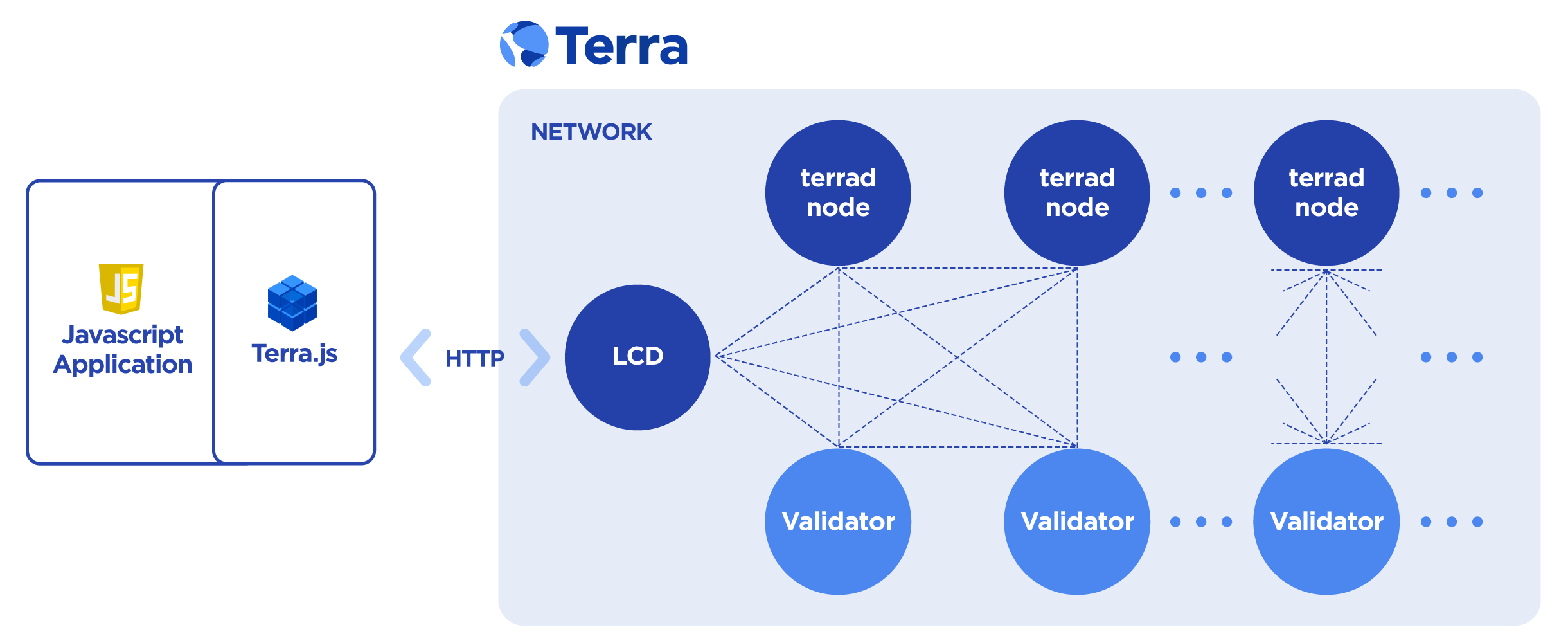
Security News
Research
Data Theft Repackaged: A Case Study in Malicious Wrapper Packages on npm
The Socket Research Team breaks down a malicious wrapper package that uses obfuscation to harvest credentials and exfiltrate sensitive data.
@terra-money/terra.js
Advanced tools

The JavaScript SDK for Terra



Explore the Docs »
Examples
·
API Reference
·
NPM Package
·
GitHub
Terra.js is a JavaScript SDK for writing applications that interact with the Terra blockchain from either Node.js, browser, or React Native environments and provides simple abstractions over core data structures, serialization, key management, and API request generation.
LCDClientWe highly suggest using Terra.js with TypeScript, or JavaScript in a code editor that has support for type declarations, so you can take advantage of the helpful type hints that are included with the package.
Grab the latest version off NPM:
npm install @terra-money/terra.js
Terra.js can be used in Node.js, as well as inside the browser. Please check the docs for notes on how to get up and running.
:exclamation: terra.js can connect both terra-classic and terra network. If you want to communicate with classic chain, you have to set isClassic as true.
import { LCDClient, Coin } from '@terra-money/terra.js';
// connect to pisco testnet
const terra = new LCDClient({
URL: 'https://pisco-lcd.terra.dev',
chainID: 'pisco-1',
isClassic: false // if it is unset, LCDClient assumes the flag is false.
});
// connect to columbus-5 terra classic network
const terra = new LCDClient({
URL: 'https://columbus-lcd.terra.dev',
chainID: 'columbus-5',
isClassic: true // *set to true to connect terra-classic chain*
});
// To use LocalTerra
// const terra = new LCDClient({
// URL: 'http://localhost:1317',
// chainID: 'localterra'
// });
// get the current balance of `terra1x46rqay4d3cssq8gxxvqz8xt6nwlz4td20k38v`
const balance = terra.bank.balance('terra1x46rqay4d3cssq8gxxvqz8xt6nwlz4td20k38v');
console.log(balance);
First, get some testnet tokens for terra1x46rqay4d3cssq8gxxvqz8xt6nwlz4td20k38v, or use LocalTerra.
import { LCDClient, MsgSend, MnemonicKey } from '@terra-money/terra.js';
// create a key out of a mnemonic
const mk = new MnemonicKey({
mnemonic:
'notice oak worry limit wrap speak medal online prefer cluster roof addict wrist behave treat actual wasp year salad speed social layer crew genius',
});
// connect to bombay testnet
const terra = new LCDClient({
URL: 'https://pisco-lcd.terra.dev',
chainID: 'pisco-1',
});
// To use LocalTerra
// const terra = new LCDClient({
// URL: 'http://localhost:1317',
// chainID: 'localterra'
// });
// a wallet can be created out of any key
// wallets abstract transaction building
const wallet = terra.wallet(mk);
// create a simple message that moves coin balances
const send = new MsgSend(
'terra1x46rqay4d3cssq8gxxvqz8xt6nwlz4td20k38v',
'terra17lmam6zguazs5q5u6z5mmx76uj63gldnse2pdp',
{ uluna: 1200000}
);
wallet
.createAndSignTx({
msgs: [send],
memo: 'test from terra.js!',
})
.then(tx => terra.tx.broadcast(tx))
.then(result => {
console.log(`TX hash: ${result.txhash}`);
});
You can access all the objects of the @terra-money/terra.js from the global Terra object if you load Terra.js with a <script> tag.
Include the following in your browser:
<script
crossorigin
src="https://unpkg.com/@terra-money/terra.js/dist/bundle.js"
></script>
You can find a small JSFiddle example that refreshes current Oracle votes here.
In order to use Terra.js inside React Native, you need to add the node-libs-react-native package and react-native-get-random-values package to your React Native app's package.json.
yarn add node-libs-react-native react-native-get-random-values
You will need to register Node.js native modules in an entry point of your application, such as index.tsx:
import 'node-libs-react-native/globals';
import 'react-native-get-random-values';
Also, add resolvers to your metro.config.js
module.exports {
// ...
resolver: {
// ...
extraNodeModules: require('node-libs-react-native'),
},
// ...
}
This software is licensed under the MIT license. See LICENSE for full disclosure.
© 2020 Terraform Labs, PTE.
FAQs
The JavaScript SDK for Terra
We found that @terra-money/terra.js demonstrated a not healthy version release cadence and project activity because the last version was released a year ago. It has 8 open source maintainers collaborating on the project.
Did you know?

Socket for GitHub automatically highlights issues in each pull request and monitors the health of all your open source dependencies. Discover the contents of your packages and block harmful activity before you install or update your dependencies.

Security News
Research
The Socket Research Team breaks down a malicious wrapper package that uses obfuscation to harvest credentials and exfiltrate sensitive data.

Research
Security News
Attackers used a malicious npm package typosquatting a popular ESLint plugin to steal sensitive data, execute commands, and exploit developer systems.

Security News
The Ultralytics' PyPI Package was compromised four times in one weekend through GitHub Actions cache poisoning and failure to rotate previously compromised API tokens.